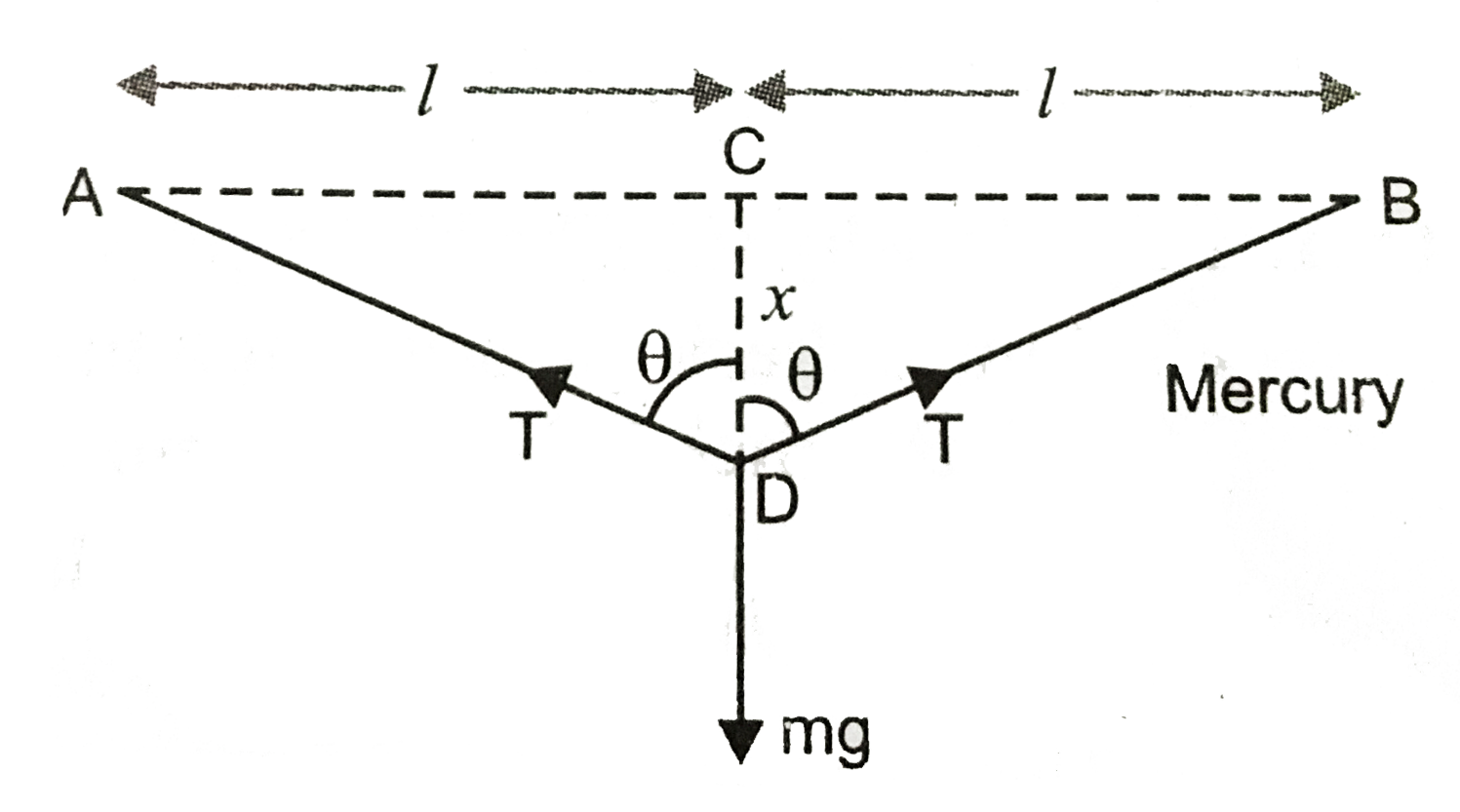A load of mass 100 gm increases the length of wire by 10 cm. If the system is kept in oscillation, its time period is (g=10m/s2)
Data : m = 100 g = 100×10−3 kg , x = 10 cm, = 0.1 m = g = 9.8 m/s2
m1=400g=400×10−3 kg
(1) Stretching force F = mg
F = kx ( numerically) where k is the force contsant .
mg = kx
k=mgx=100×10−3×9.80.1=9.8 N/m
The period , T=2π,√mk=2×3.142×√0.19.8=0.6348s
(2) T1=2π√m1k
T1T=√m1m,
The new period , T1=T
⎷m1m=0.6348×√40×10−3100×10−3
=0.6348×2=1.2696s
Topper's Solved these Questions
- BOOK - NAVNEET PUBLICATION - MAHARASHTRA BOARDCHAPTER - SOLVED PROBLEMS - I EXERCISE - ELASTICITY26videos
SOLVED PROBLEMS - I
- BOOK - NAVNEET PUBLICATION - MAHARASHTRA BOARDCHAPTER - SOLVED PROBLEMS - I EXERCISE - WAVE MOTION11videos
SOLVED PROBLEMS - I
- BOOK - NAVNEET PUBLICATION - MAHARASHTRA BOARDCHAPTER - SOLVED PROBLEMS - I EXERCISE - GRAVITATION9videos
SOLVED PROBLEMS - I
- BOOK - NAVNEET PUBLICATION - MAHARASHTRA BOARDCHAPTER - SHORT ANSWER QUESTIONSEXERCISE - Assignments3videos
SHORT ANSWER QUESTIONS
- BOOK - NAVNEET PUBLICATION - MAHARASHTRA BOARDCHAPTER - SOLVED PROBLEMS-II EXERCISE - Assignments5videos
SOLVED PROBLEMS-II
Similar Questions
A load of mass 100 gm increases the length of wire by 10 cm. If the system is kept in oscillation, its time period is (g=10m/s2)
View SolutionThe length of the seconds pendulums is first increased by 10 cm and then decreased by 5 cm. If the time period is determined in each case, find their ratio (Take g=10ms−2,π2≅10)
View Solution
Knowledge Check
- Question 1 - Select One
A load of mass M is attached to the bottom of a spring of mass 'M/3' and spring constant 'K'. If the system is set into oscillation, the time period of oscillation is
A2π3√10MKB4π√M3KC4π√MKD2π√M3K - Question 2 - Select One
A mass of 10 gm moving with a velocity of 100 cm / s strikes a pendulum bob of mass 10 gm . The two masses stick together. The maximum height reached by the system now is (g=10m/s2)
AzeroB5 cmC2.5 cmD1.25 cm - Question 3 - Select One
When a wire 2 m long and 0.05cm2 in cross-section is stretched by a mass of 2 kg, it increases in length by 0.04 mm. Young's modulus of the material of the wire is
(g=10ms−2)A2×109Nm−2B20×1010Nm−2C20×1011Nm−2D20×108Nm−2
The length of the seconds pendulums is first increased by 10 cm and then decreased by 5 cm. If the time period is determined in each case, find their ratio (Take g=10ms−2,π2≅10)
View SolutionCalculate the time period of oscillation of a uniform recctangular plate of length 96cm and breath 10cm when it is oscillating freely about one of its corners. (g=9.8ms−2).
View SolutionA solid cube floats in water half immersed and h small vertical oscillations of time period π5s. Find the mass (in kg) (Take g=10m/s2.
View SolutionA mild steel wire of length 1.0 m and cross-sectional are 0.5×10−20cm2 is streached, well within its elastic limit, horizontally between two pillars. A mass of 100 g is suspended from the mid point of the wire, calculate the depression at the mid point.
g=10ms−2,Y=2×1011Nm−2.
 View Solution
View SolutionA spring is stretched by 0.20 m , when a mass of 0.50 kg is suspended. When a mass of 0.25 kg is suspended, then its period of oscillation will be (g=10m/s2)
View Solution
